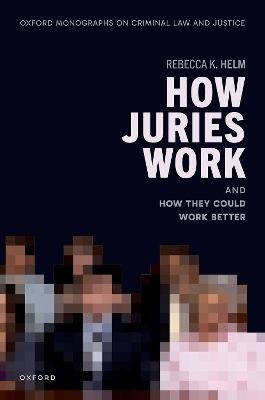
How Juries Work
And How They Could Work Better
Seiten
2024
Oxford University Press (Verlag)
978-0-19-285729-3 (ISBN)
Oxford University Press (Verlag)
978-0-19-285729-3 (ISBN)
How Juries Work integrates legal and psychological theory and research to present a comprehensive assessment of the modern criminal law jury, and of how evidence-based research can improve jury performance.
The majority of common law jurisdictions, and some civil law jurisdictions, use juries composed of citizens drawn from the general population to deliberate and reach collective verdicts in criminal cases. Juries are relied on to use their collective judgment to reach verdicts that accord with normative legal goals; for example, by being accurate and fair.
How Juries Worksuggests that, though important symbolically, the current jury system is not necessarily well designed to meet the demands of modern society, which increasingly requires evidence-based procedure that is carefully designed to achieve normative goals. Rebecca K. Helm proposes new models of how jurors and juries function in practice, informed by psychological theory and empirical research, which provide a framework to interpret and integrate the large body of existing work on jury decision-making. Drawing on this framework, Helm highlights the deficiencies and strengths of the jury as a legal fact-finder, providing key insights into how to minimize deficiencies and maximize strengths through trial procedure. The book concludes with a set of timely evidence-based suggestions as to how procedure surrounding trial by jury might be altered to enhance the administration of justice in the many jurisdictions where the criminal law jury is utilized.
How Juries Workintegrates legal and psychological theory and research to present a comprehensive assessment of the modern criminal law jury, and of how evidence-based research can improve jury performance.
The majority of common law jurisdictions, and some civil law jurisdictions, use juries composed of citizens drawn from the general population to deliberate and reach collective verdicts in criminal cases. Juries are relied on to use their collective judgment to reach verdicts that accord with normative legal goals; for example, by being accurate and fair.
How Juries Worksuggests that, though important symbolically, the current jury system is not necessarily well designed to meet the demands of modern society, which increasingly requires evidence-based procedure that is carefully designed to achieve normative goals. Rebecca K. Helm proposes new models of how jurors and juries function in practice, informed by psychological theory and empirical research, which provide a framework to interpret and integrate the large body of existing work on jury decision-making. Drawing on this framework, Helm highlights the deficiencies and strengths of the jury as a legal fact-finder, providing key insights into how to minimize deficiencies and maximize strengths through trial procedure. The book concludes with a set of timely evidence-based suggestions as to how procedure surrounding trial by jury might be altered to enhance the administration of justice in the many jurisdictions where the criminal law jury is utilized.
How Juries Workintegrates legal and psychological theory and research to present a comprehensive assessment of the modern criminal law jury, and of how evidence-based research can improve jury performance.
Rebecca K. Helm is an Associate Professor of Law and Director of the Evidence-Based Justice Lab at the University of Exeter Law School, and a current UK Research and Innovation Fellow. She is an expert in the field of psychology and law and using quantitative methodologies to examine the legal system. Her research examines how legal procedures work in practice, and how changing aspects of procedure can enhance the ability of the justice system to achieve normative goals. Her work has been funded by several research bodies and has been widely published in leading journals in both law and psychology.
| Erscheinungsdatum | 22.08.2024 |
|---|---|
| Reihe/Serie | Oxford Monographs on Criminal Law and Justice |
| Verlagsort | Oxford |
| Sprache | englisch |
| Maße | 165 x 240 mm |
| Gewicht | 522 g |
| Themenwelt | Recht / Steuern ► Allgemeines / Lexika |
| Recht / Steuern ► EU / Internationales Recht | |
| Recht / Steuern ► Strafrecht | |
| ISBN-10 | 0-19-285729-0 / 0192857290 |
| ISBN-13 | 978-0-19-285729-3 / 9780192857293 |
| Zustand | Neuware |
| Informationen gemäß Produktsicherheitsverordnung (GPSR) | |
| Haben Sie eine Frage zum Produkt? |
Mehr entdecken
aus dem Bereich
aus dem Bereich
Buch | Softcover (2023)
Franz Vahlen (Verlag)
CHF 27,70
Sammlung des Zivil-, Straf- und Verfahrensrechts, Rechtsstand: 14. …
Buch | Hardcover (2024)
C.H.Beck (Verlag)
CHF 53,20
Klausuren, Hausarbeiten, Seminare, Bachelor- und Masterarbeiten
Buch | Softcover (2021)
C.H.Beck (Verlag)
CHF 17,95


